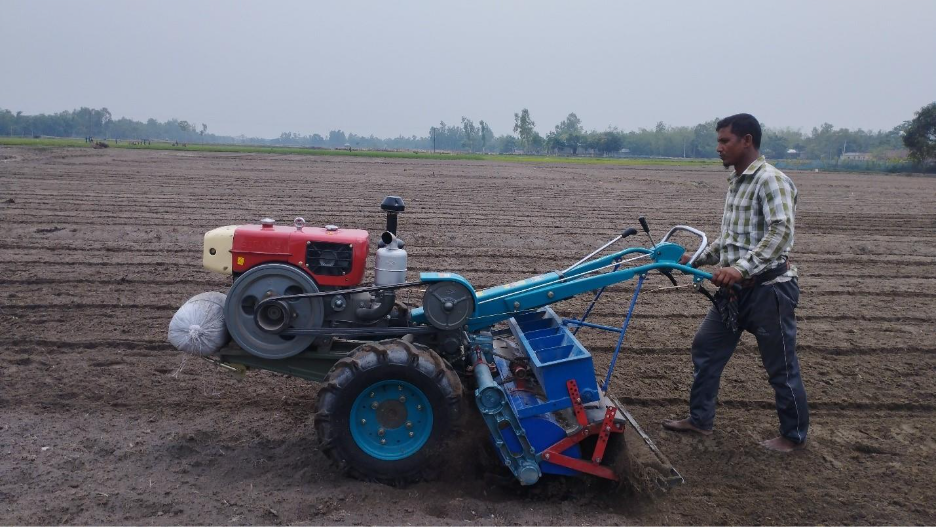Engaging youth in farming is key to the future food security of Bangladesh
By Abdul Haque, Sharif Ahmed, and Humnath Bhandari Photo 1: A youth local service provider (LSP) sows direct-seeded rice (DSR) using a two-wheel power tiller-operated seeder in Nilphamari, Bangladesh. Photo credit: Asad, IRRI Bangladesh’s economy heavily relies on agriculture, with a significant portion of the population directly and indirectly dependent on it for their livelihoods. Agriculture contributes approximately 11%
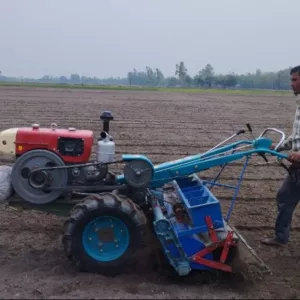
Engaging youth in farming is key to the future food security of Bangladesh
By Abdul Haque, Sharif Ahmed, and Humnath Bhandari
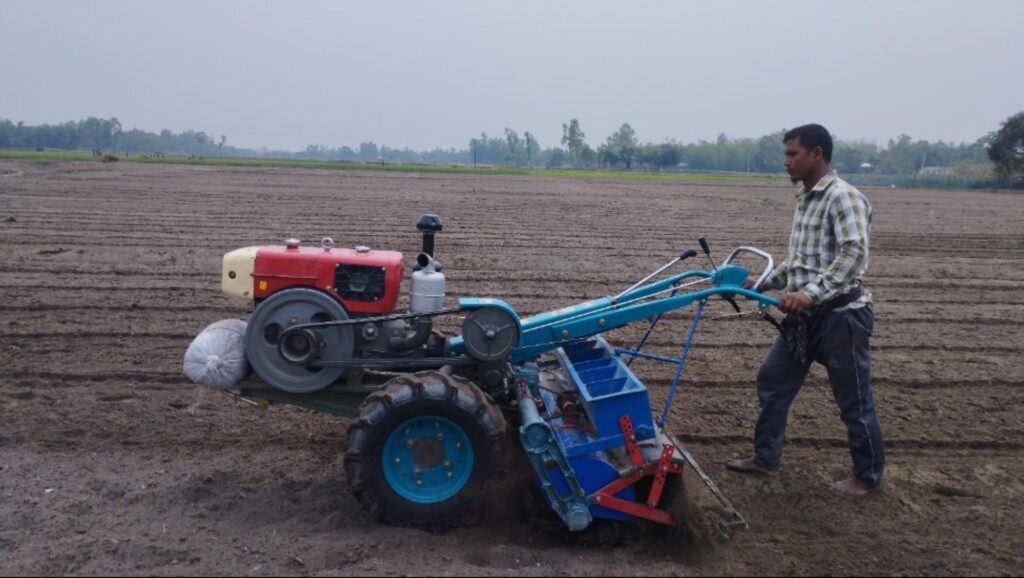
Bangladesh’s economy heavily relies on agriculture, with a significant portion of the population directly and indirectly dependent on it for their livelihoods. Agriculture contributes approximately 11% to the country’s GDP and is crucial to employment generation and food security. Despite its importance, the agricultural sector faces significant challenges due to climate change, rapid population growth, rising input costs, labor shortages, and the conversion of farmland for unplanned developments. These factors are increasing the pressure on food security.
Food security issues in Bangladesh
Population growth rate in Bangladesh is 1.08%, which places immense pressure on the country’s food production, distribution, and consumption systems (BBS 2023). Most farmers in Bangladesh still rely on traditional farming methods, leading to low agricultural yields. Furthermore, urbanization and industrialization are causing agricultural land to diminish daily, while the country needs to enhance its food production to support its growing population.
Food production is frequently disrupted by natural disasters such as floods, cyclones, droughts, and salinity intrusion in coastal regions. Additionally, insufficient storage, transportation, and preservation facilities result in significant food loss. This loss reduces the effective food supply and consequently affects prices and availability. As a result of low incomes and high food prices, many people, both in rural and urban areas, often face food insecurity.
Challenges of Labor in Agriculture
In Bangladesh, agriculture continues to be the main source of employment, although it is in a decreasing trend (Figure below). In 1991, agriculture constituted approximately 65% of total employment, which declined to around 35% by 2023. This trend shows a structural change in the economy, shifting labor from agriculture to other sectors like industry and services.
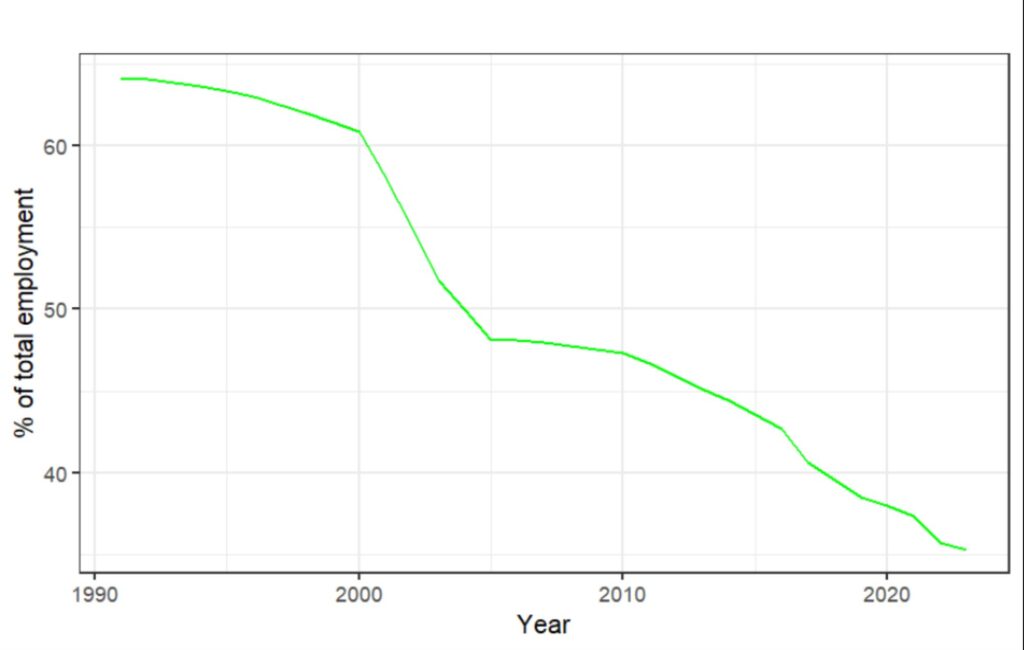
Women constitute a significant part of the agricultural labor force, with estimates indicating that they make up over half of the workforce in this industry (Begum & Sharma, 2024). Despite working similar hours, female agricultural laborers earn considerably less than their male counterparts. Male agricultural workers typically earn around 600 BDT per day, while female agricultural workers generally earn between 400 and 500 BDT (Begum & Sharma, 2024).
There is a labor shortage in agriculture as many rural workers are migrating to cities or other countries. This movement is primarily driven by low wages and challenging working conditions in the farming sector. Farmers often face delays in their tasks due to the shortage of agricultural labor, especially during peak periods such as planting and harvesting. This labor crisis has resulted in higher production costs. The lack of workers frequently causes delays in planting and harvesting, which increases the risk of natural disasters and leads to lower crop yields.
In Bangladesh, agriculture faces challenges in attracting young people due to its nature, which is often perceived as tedious and physically demanding. Traditional agricultural practices typically provide low income and limited social status, further discouraging youth from engaging in this sector. Currently, most farm laborers are middle-aged or elderly, as younger individuals increasingly prefer jobs in garment factories, construction, or ride-sharing services, which offer steadier wages and better working conditions.
Traditional farming is perceived as backbreaking work that requires long hours in harsh weather for daily wages that are far below what is offered in the industrial sector. Additionally, traditional agricultural systems lack opportunities for career advancement, technological appeal, and social recognition, all of which further deter young people from pursuing a career in farming. Many view agriculture as a last resort option rather than a viable livelihood, contributing to rural-to-urban migration and labor shortages in the agricultural sector.
Why subsistence farming is becoming less sustainable
Currently, agriculture in Bangladesh is primarily of the subsistence type. Subsistence agriculture is a small-scale farming system where farmers grow crops mainly to feed their families, with little or no surplus available for sale. This type of farming relies on traditional methods, basic tools, and family labor. While it ensures food security for the farmers, it often falls short in terms of productivity and income potential when compared to commercial farming.
Subsistence farming in Bangladesh is becoming increasingly unsustainable due to rising labor shortages and costs. The increasing prices of agricultural inputs, such as fertilizers, seeds, fuel, and pesticides, further strain the budgets of smallholder farmers, reducing their profitability. With an aging farmer population and declining productivity, traditional farming methods are failing to meet household needs.
Why does Bangladesh need mechanized agriculture?
Bangladesh urgently needs to adopt mechanized agriculture to tackle the challenges posed by a shrinking farm labor force, rising production costs, and climate vulnerabilities. With more than 60% of farmers aged 50 and older, and increasing numbers of youth migrating to cities, traditional manual farming methods are becoming unsustainable. Over the past decade, labor wages have doubled, making these traditional practices prohibitively expensive; rice farming now allocates 40-50% of its costs to manual labor.
Additionally, climate change exacerbates these issues, as erratic rainfall patterns and shorter planting windows require precise and timely operations that only machinery can provide. Mechanization significantly enhances efficiency—transplanters can reduce labor needs by 80%, while combine harvesters can decrease post-harvest losses from 20% to under 5%.
In Bangladesh, rice is the dominant crop, and during peak seasons of transplanting and harvesting, farmers are often unable to plant or harvest rice due to a lack of sufficient manpower. To fill this gap, Bangladesh needs to mechanize rice cultivation. Mechanization helps in addressing the labor shortage and ensures prompt operations, avoiding yield reductions. Utilizing equipment such as power tillers, transplanters, and combined harvesters can greatly decrease production costs and boost profitability. Machines allow for consistent and quicker field tasks, resulting in a yield advantage and enhanced grain quality. Modern machinery and precise farming techniques are more appealing to the younger generation, motivating them to remain in or come back to agriculture.
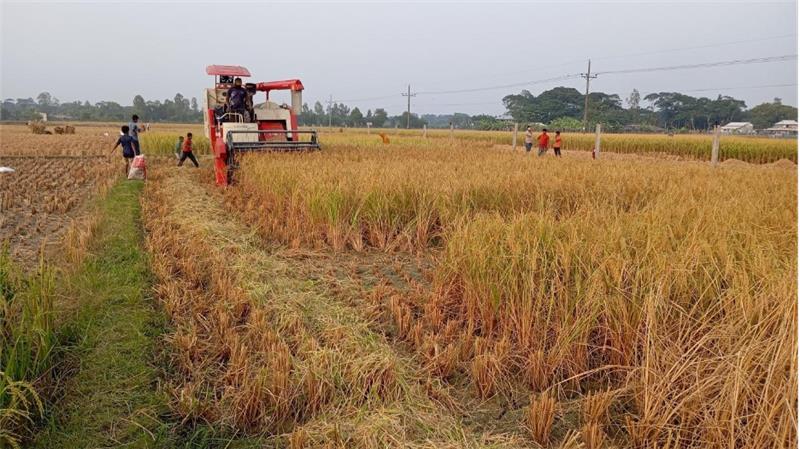
Engage youth in mechanized agriculture for sustainability
Mechanized farming is essential to modern agriculture (Rahman et al., 2021). Engaging youth in Bangladesh’s mechanized agriculture is key to ensuring sustainability and offers an important opportunity for young people to participate in the sector.
Youth inject energy, creativity, and a willingness to embrace modern technologies, crucial for enhancing agriculture’s efficiency and competitiveness. By championing sustainability, innovation, and entrepreneurship, Bangladesh’s young generation can transform agriculture into a profitable and dynamic sector. They are quick learners, well-equipped for training in equipment operation, maintenance, and repair. Their keen interest in digital and smart technologies, like precision farming tools, further boosts potential. Additionally, youth-led ventures such as machinery rental services can create jobs and provide affordable access to equipment for smallholder farmers, fostering inclusive growth.
Additionally, youth can take part in or lead training sessions for other farmers on the usage and benefits of farming machinery. With support from extension services or NGOs, they can act as “mechanization ambassadors” within their communities.
The future of agriculture in Bangladesh hinges on youth involvement. Their participation is essential for sustainable farming. By embracing mechanization and engaging young people, Bangladesh can enhance food security, create jobs, and promote rural development.
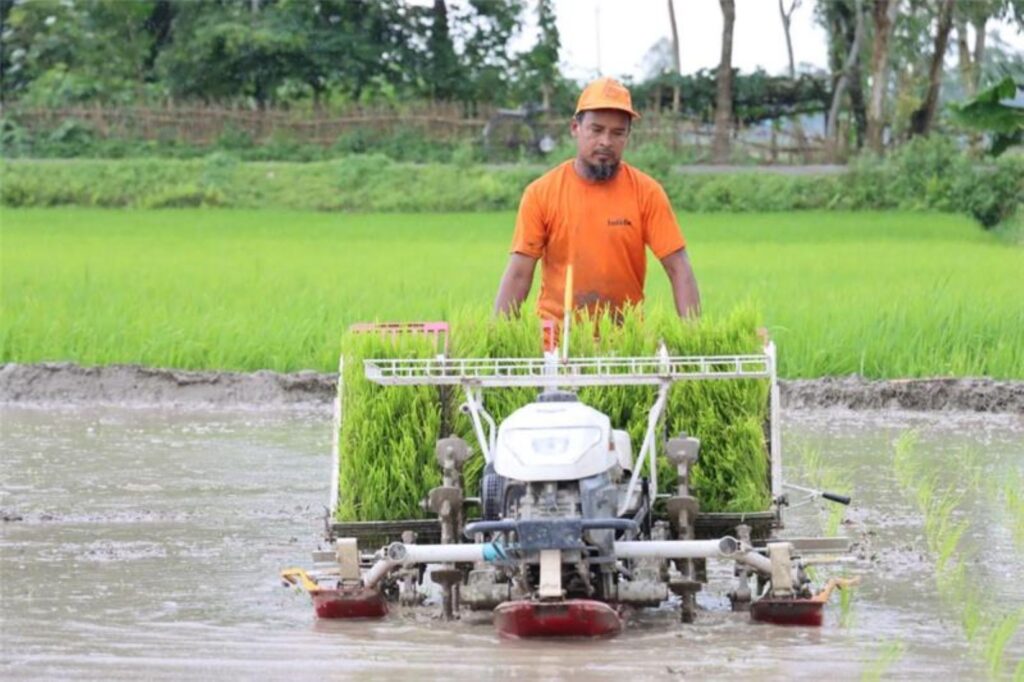
Youth involvement in CGIAR initiative Mixed Farming Systems
IRRI Bangladesh, through the CGIAR science program, has been working on rice and homestead-based mechanization. In northern Bangladesh, IRRI has focused on mechanized rice transplanting and mechanized Direct Seeded Rice (DSR). As part of its homestead mechanization activities, IRRI has provided small agricultural machinery—including fodder choppers, mini rice husking mills, oil extractors, and maize shellers—to both young men and women. The adoption of small agricultural equipment can enable youth to engage more actively in farming. This change not only enhances their participation in agricultural activities but also creates new chances for the family to generate income.
Rahim Uddin, 30, Rangpur, a LSP, said that “With mechanized Direct Seeded Rice transplanting, I’ve turned my skills into a profitable business. It’s not just about improving efficiency—it’s about creating sustainable income that allows me to grow, expand, and provide better opportunities for me and my family.”
Ratna Begum, 29, a mini husking mill LSP, Rangpur shares, “I used to depend completely on my husband’s income, but now, with the husking mill, I earn BDT 200–300/day by milling paddy and wheat for my neighbors. I purchase paddy from local farmers, process it, and sell the rice in the village.
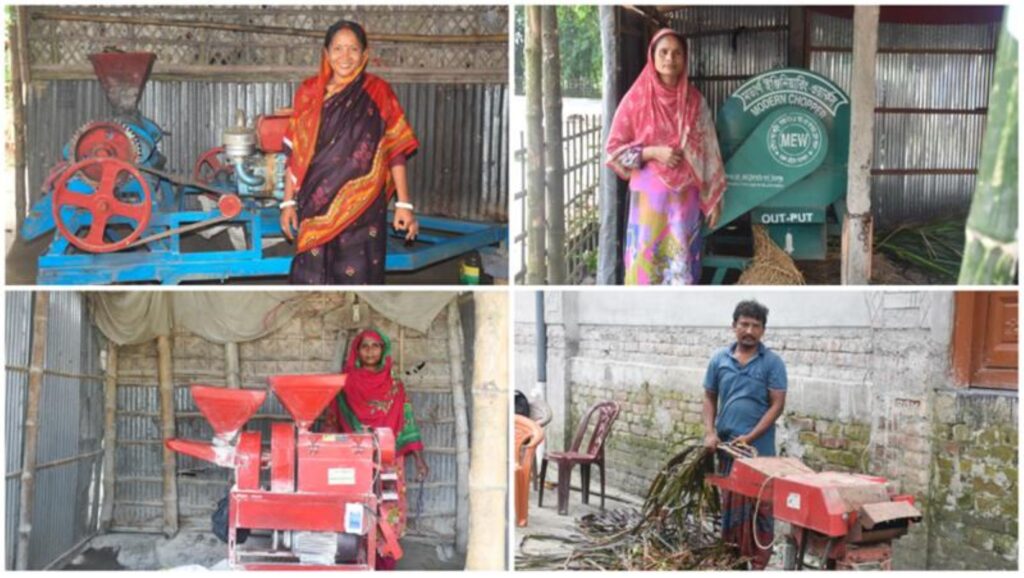
References:
BBS. (2023). Population and Housing Census 2022: National Report (Volume I). Bangladesh Bureau of Statistics, Statistics and Informatics Division, Ministry of Planning, Government of the People’s Republic of Bangladesh. Retrieved April 20, 2025, from https://bbs.portal.gov.bd/sites/default/files/files/bbs.portal.gov.bd/page/b343a8b4_956b_45ca_872f_4cf9b2f1a6e0/2024-01-31-15-51-b53c55dd692233ae401ba013060b9cbb.pdf
Begum, S., & Sharma, I. K. (2024). The invisibility of women’s labor in Bangladesh’s agriculture. International Water Management Institute. Retrieved April 23, 2025, from https://www.iwmi.org/blogs/the-invisibility-of-womens-labor-in-bangladeshs-agriculture/?utm_source=chatgpt.com
Rahman, M. M., Ali, M. R., Oliver, M. M. H., Hanif, M. A., Uddin, M. Z., Tamim-Ul-Hasan, N., Saha, K. K., Islam, M. H., & Moniruzzaman, M. (2021). Farm mechanization in Bangladesh: A review of the status, roles, policy, and potentials. Journal of Agriculture and Food Research, 6, 100225. https://doi.org/10.1016/j.jafr.2021.100225


